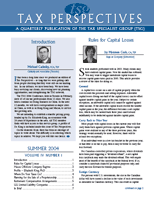
PDF Format
 Issue Contents Issue Contents
 All Issues All Issues
Summer 2004
Volume 4, Number 1
The information in Tax Perspectives is prepared for general interest only. Every effort has been made to ensure that the contents are accurate. However, professional advice should always be obtained before acting on the information herein.
U.S. Limited Liability Companies
By Kim Moody, CA, TEP
Moodys LLP Tax Advisors (Calgary)
Until the mid 1990s, it was common to carry on business in the U.S. either through a corporation or a partnership, including a limited partnership. Because U.S. persons could elect for a corporation to be a flow-through entity for tax purposes (subchapter S election), the income could be taxed at the shareholder level, rather than in the corporation, thereby preventing the double taxation for which the U.S. tax system is infamous. Such arrangements had a number of drawbacks, however, and limited partnerships had disadvantages also. Against this background, a new type of entity grew in popularity — the limited liability company ("LLC"). Depending on how the LLC was legally constituted, for tax purposes it could be either a corporation or a partnership (a disregarded entity if it had only one owner). Finally, the IRS gave up on classification based on subtle legal distinctions, and decided to allow taxpayers to designate whether an LLC was to be taxed as a corporation or as a disregarded entity, the latter resulting in taxation at the owner level. Tax planning schemes evolved around the use of LLCs, particularly in combinations, whereby U.S. tax could be avoided or substantially reduced. These schemes, which normally involved non-residents of the U.S. in combination with U.S. businesses, were finally stopped by denying tax treaty benefits in respect of passive income of LLCs. Faced with a 30% withholding tax, the schemes quickly collapsed. Now the question that remains is whether U.S. LLCs are still attractive to Canadians. The answer is a cautious yes. A U.S. LLC will be treated as a corporation for Canadian tax purposes, regardless of how it is treated for U.S. tax purposes. This can lead to a curious result. Suppose that the LLC is treated as a flow-through entity for U.S. purposes. If so, then the Canadian owner will pay tax on the U.S. business income, and will file a U.S. income tax return. However, for Canadian tax purposes, no income will result until funds are withdrawn in some fashion from the LLC. Without careful planning, this can result in double taxation, once for U.S. purposes when the income is earned, and then again for Canadian purposes when the income is withdrawn. However, if the income is withdrawn in the same year as it is earned, then the U.S. tax can be matched against the Canadian tax, potentially resulting in less tax overall than what would occur if a U.S. corporation had been used instead. The tax savings can be 10% or more, which is meaningful on larger amounts of income. The U.S. LLC has several potential disadvantages, the most significant being, that under the current version of the Canada-U.S. treaty (a revision is being considered), it does not obtain treaty benefits. Therefore, it may be considered Canadian resident if its mind and management is in Canada, and may be taxable in Canada if it carries on business in Canada, even if it does not have a permanent establishment. Secondly, if the LLC has related party transactions involving Canada, transfer pricing may become an issue, and recourse may not be available to the arbitration provisions of the Canada-U.S. treaty. Having said this, if the tax affairs of the LLC are closely monitored, these problems should not arise. The owner of a U.S. LLC is taxable in the U.S. only on U.S. source income, and not on income from outside the U.S. In addition, capital gains will not be subject to U.S. tax, unless they arise from the sale of U.S. business assets or U.S. real property interests. Therefore, a U.S. LLC can be used as a holding company, without it being subject to tax by either Canada or the U.S. In some ways, the U.S. LLC could be the ultimate tax haven vehicle. If a U.S. corporation is already in existence in a corporate structure, it can be reconfigured into an LLC on a tax-free basis. While certain formalities need to be observed, it is likely that substantial amounts of income can be earned directly by the Canadian owners, commencing immediately after the LLC has been put in place. Therefore, instant tax benefits can be derived. If you currently own a U.S. corporation, and would like an evaluation as to whether a U.S. LLC is appropriate in your circumstances, please contact us.
| 




